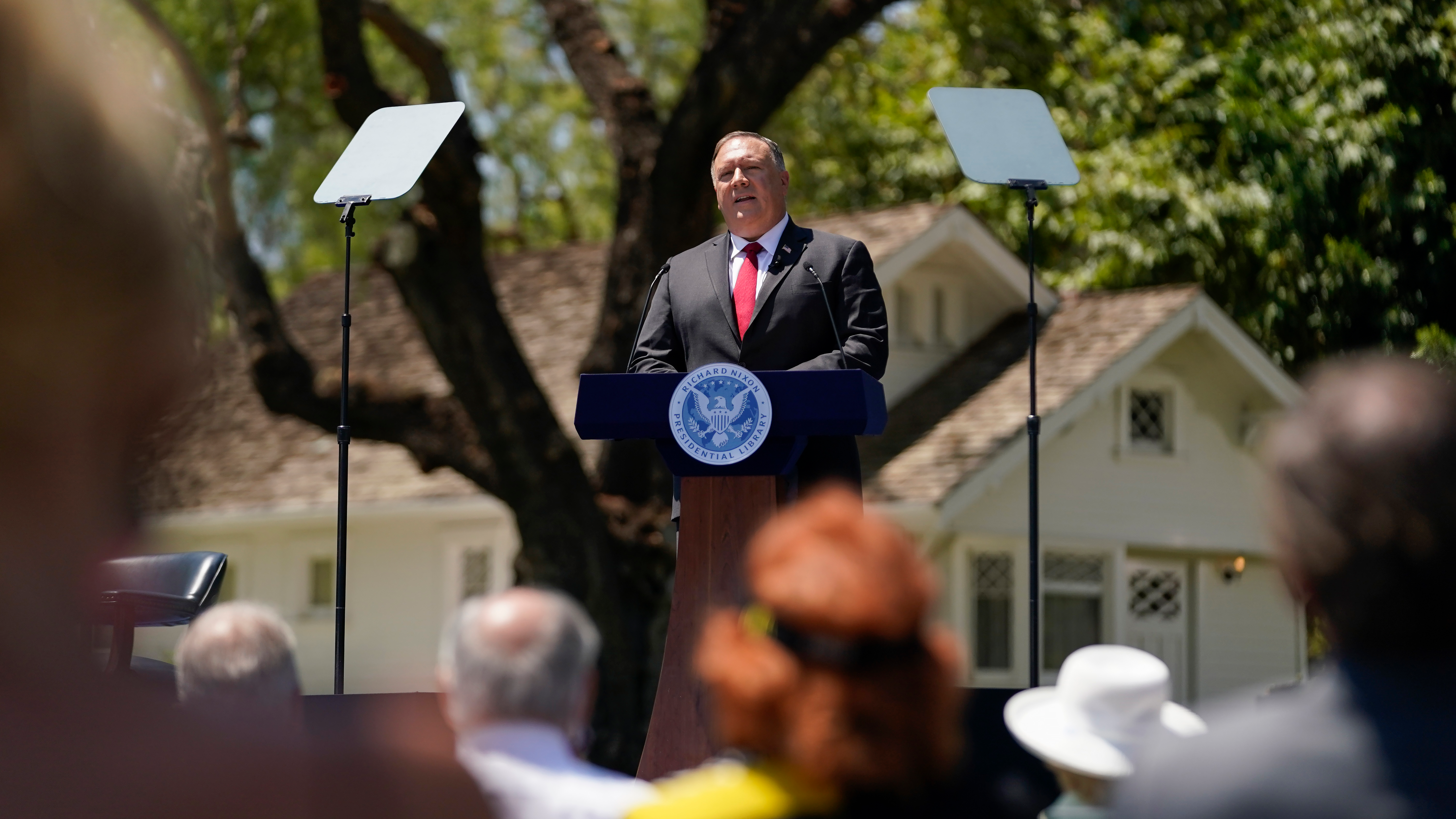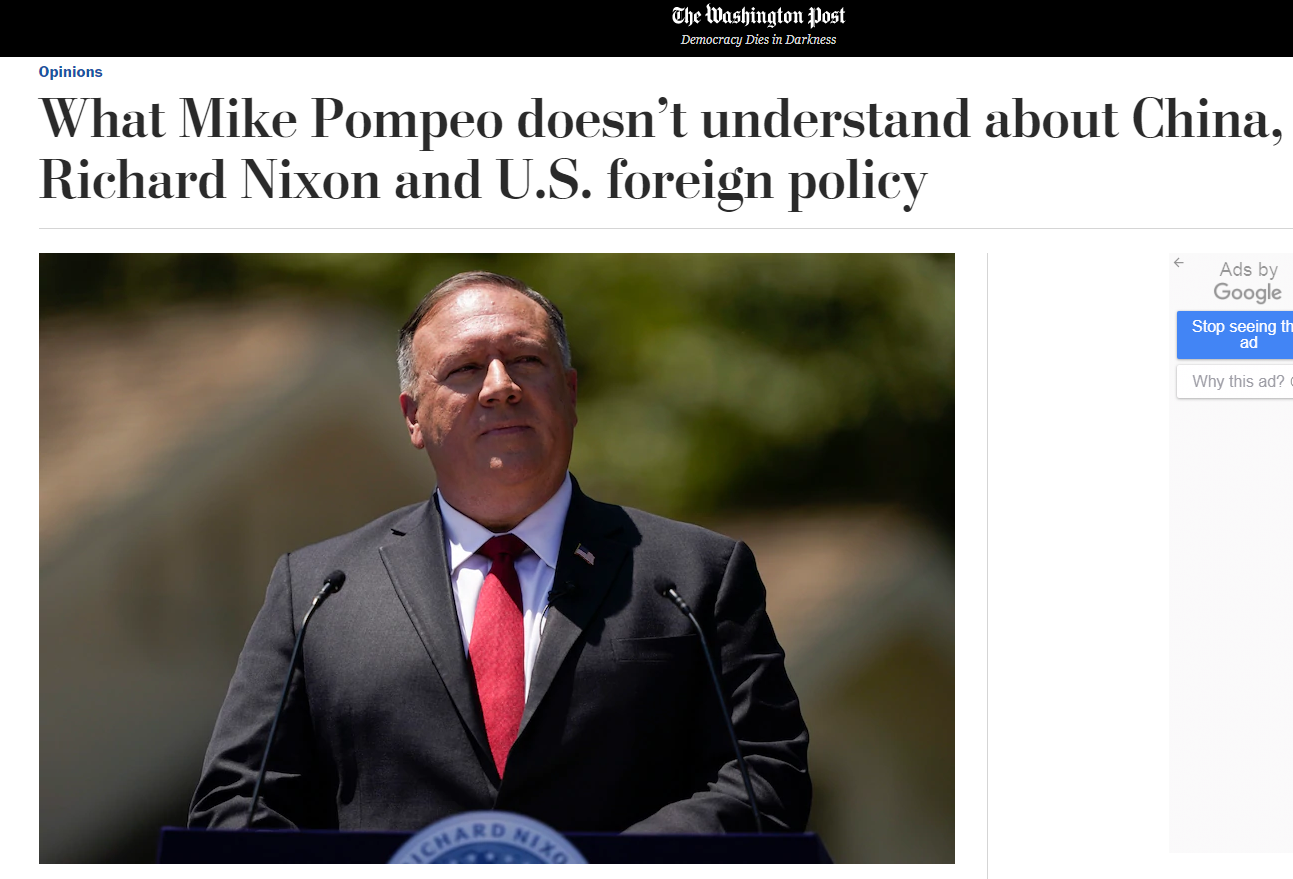
U.S. Secretary of State Mike Pompeo speaks at the Richard Nixon Presidential Library in Yorba Linda, California, July 23, 2020. /AP
U.S. Secretary of State Mike Pompeo speaks at the Richard Nixon Presidential Library in Yorba Linda, California, July 23, 2020. /AP
Editor's note: Mario Cavolo is a senior fellow at the Center for China and Globalization. The article reflects the author's opinions, and not necessarily views of CGTN.
The realization of sense and truth often arrives as a collective rush, a sudden shift in the wind, or even an eerie satisfying calm that descends on your mind and emotions. The realization that the manipulators have overplayed their hand followed by the realization that they did so intentionally and are failing. For example, a high-level official delivering a course-altering political speech at an auspicious location in history, a speech that was so brazenly off course and surreal that everyone finally understood they were being played, not that the speaker meant or believed a word of it.
I am referring of course to Secretary of State Mike Pompeo's speech last week at the Nixon Library in southern California. Pompeo's Nixon Library speech wasn't given to deliver a new policy. It was given to test how ridiculously far the current small yet strategically key group of people in the U.S. administration could push their radical populist messaging. As we might say in Chinese, "Tai guo fen le." They intentionally went "over the line" and don't doubt for a minute their intent was neither sincerity, authenticity nor diplomacy, but to test the waters.
The backlash was instantaneous and brutal in reply. Countless voices widely condemned such histrionics, ranging from China's Foreign Minister Wang Yi to Richard Haass, president of the Council on Foreign Relations and Australia's Dr. Alan Dupont, a research fellow at the Hinrich Foundation.
The three Ps of Pompeo, politicking and posturing have hit the proverbial wall. No one short of a psychotic dictator would write and utter the words of that speech believing they had a shred of truth or connection to reality in them. That, ladies and gentlemen, is simply called theater.
"Pompeo also sought to commit the United States to a path that is bound to fail. It is not within our power to determine China's future, much less transform it." – Richard Haass, Council on Foreign Relations

Screenshot of Richard Haass' article on The Washington Post website.
Screenshot of Richard Haass' article on The Washington Post website.
A blistering response was published by Thomas Wright, senior fellow at the Brookings Institution in The Atlantic. Mr. Wright noted, "He says the U.S. will organize the free world while alienating and undermining the free world; he extols democracy while aiding and abetting its destruction at home, and he praises the Chinese people while generalizing about the ill intent of Chinese students who want to come to America."
Found in the real world of diplomacy and cooperation where it counts most, for example, in the fields of science, healthcare and the future plans of U.S. multinational companies in China, the latest news and outlook reveals that the "the political bark of the dog is much worse than the bite in reality."
My own recent private research assignment led me to report that U.S. companies have remarkably positive plans for their future in China, in significant contrast to the idea, according to MSNBC, that "U.S. companies are leaving China in droves." Nothing could be further from the truth as AmCham China Chairman Greg Gilligan noted in the findings of their March 2020 member survey, stating that less than one percent of those surveyed have indicated they would leave China.
Washington-based U.S. China Business Council President Craig Allen chimes in by adding, "All USCBC companies want to invest more in China and expand in China because China is producing approximately 30 percent of global economic growth, more than Europe, Japan and the U.S. combined."
While the New York Times recently reported more healthcare industry corruption with senior executives reaping vast profits of more than one billion U.S. dollars as they sold shares of 11 COVID-19 vaccine-related companies, we also learn that quietly and steadily behind the scenes, U.S.-China scientific collaboration has actually increased since the start of the COVID-19 pandemic.
"China was now America's largest international partner on scientific research and the trend had continued during the COVID-19 pandemic. They're working more together than they were before." – Caroline Wagner, Ohio State University professor
According to a new study published this past Tuesday in PLOS One scientific journal, Caroline Wagner, an associate professor of international affairs at Ohio State University, said collaboration between China and the US had seen explosive growth in the past few decades. "China was now America's largest international partner on scientific research and the trend had continued during the COVID-19 pandemic," she said.
"Expertise matters. Institutions matter. There is such a thing as the global community," says Thomas Wright, senior fellow at the Brookings Institution. Of course, Mike Pompeo knows that. He knew that before he gave his intentionally disgraceful speech at the Nixon Library and he knows it still. He simply doesn't care, acting as nothing more than a sad caricature of authority and global diplomacy, a former CIA Director who publicly admitted they went to school to learn how to manipulate, lie and cheat.
Mark my words, the worst of this political charade against China is over. The intelligent pushback to end it has risen up both distinctly and broadly, sending a clear message to the Trump administration. As I have continuously predicted, it is backfiring. The time has arrived and it is time for them to pivot away from this misguided course.
(If you want to contribute and have specific expertise, please contact us at opinions@cgtn.com.)